Top 20 Best SEO Software Tools Compared (2021) (3 Free Ones)

Table of Contents
- Defining SEO tools
- SEO Tools and Where to Use Them
- How to Use SEO Tools
- Top 20 SEO Software Tools Compared (2021)
- Top 3 Free SEO Software
- Key Takeaways
- Conclusion
- FAQs
Search engine optimization (SEO) plays a significant role in the success of any business that adopts online marketing strategies. You can achieve that by optimizing your content for the right keywords throughout your website, including meta description tags. Businesses implementing SEO strategies to monitor their content, competition, and rankings need an arsenal of SEO tools.
Many people ask: What are SEO tools? What are the best SEO software tools? This is because thousands of SEO tools claim to help you with your SEO.
So, which one of these tools is the best? That is the question we are going to answer in this article. We will look at the top 20 best SEO tools and compare them to similar tools in the market. We will explore the features of these tools and see which of them will best serve your purpose.
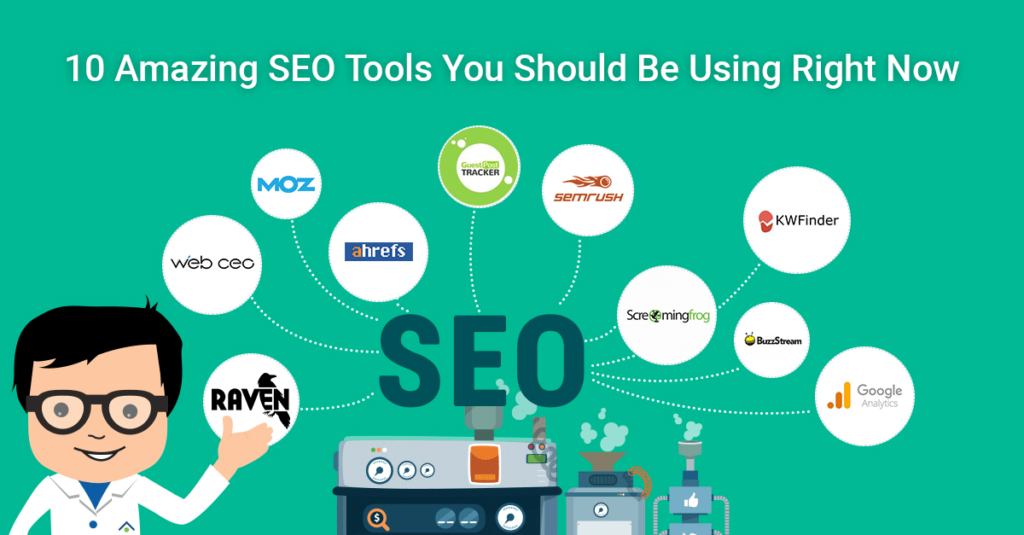
Defining SEO Tools
SEO tools are like power tools. They help you not only figure out how well your website’s health is, but they also alert you of the digital visibility of your business in the SERPs (search engine results pages).
Just like actual power tools, each product has a specific function that helps get the job done. SEO products help build better relationships between companies and their search engines by providing important insights into areas needing improvement to optimize for success.
There are SEO tools that can help you with:
- Analytics
- Keyword research
- Links
- Local SEO
- Mobile SEO
- On-page SEO
- Research
- Rank checking
- Site speed
- WordPress SEO
SEO tools can be handy, and we like to encourage each of our readers to get started with them. Even if you don’t know how to use these tools upfront, there is a good chance that you will soon learn how to leverage the benefits of proper SEO tactics to benefit your own company or personal blog.
SEO Tools and Where to Use Them
The use of SEO tools has become very important to content writers. This is because of the vast competition involved in the content writing industry. So many content writers are trying to get relevant traffic to their websites. This increases the level of competition.
One of the most important factors to help you gain relevant traffic to your website is SEO tools. SEO tools are used to help content writers optimize their content. This can help them to get their websites ranked higher in search engines.
How to Use SEO tools
The idea that SEO tools are helpful for SEO may not be groundbreaking, but it’s true. Most marketers know that knowledge is power and that one’s SEO knowledge is only as strong as the data it’s built on.
Having access to these tools will enable you to gain invaluable insights into how you can improve your website ranking via relevant keywords, for example, or even how high-ranking sites are outranking your site. You’ll also be able to use these tools to glean further information about your competitors – see how their strategy matches up with yours!
So, let’s jump into how you can use the best SEO software to your advantage before starting with the list of top SEO tools.
Understand your competitor’s SEO strategy
In a world where businesses play dirty to be on the top of the rankings and to stay in business, SEO tools provide you the freedom to spy on your competitor’s strategy while staying within the bounds of what is considered ethical.
You can use SEO tools such as SEMrush or Raven Tools to observe your competition’s SEO strategy along with their traffic numbers and rankings. You can also identify the source of their backlinks and the performance of their content.
Linking structure
One of the sneakiest ways to spy on your competitors is by using some SEO tools to see their backlink profile. Here, you can see what sites are linking back to them, their authority, the anchor text, and more.
Once you understand your competitors’ backlink profile, you can compile a checklist of sorts to check off for reaching out to those same sites you wish to obtain links from. There is no need to spend hours surfing the web for industry websites – you can create a list of opportunities that you could approach in just a matter of minutes.
Keyword opportunities
Generating a list of keyword opportunities can be more complex than it seems. Sometimes its challenges are few, but many scenarios encourage you to go further into the depths of search engine optimization. You might even feel that your SEO adventure has hit a wall and doesn’t know what to do next.
A reliable SEO tool can help us stretch our reach further by showing us which new and old keywords our competitors are managing to rank for. Understanding the nature of their success is powerful because it helps us make new connections about how they are generating traffic, which terms they are targeting. Maybe even markets they aren’t working in. Once we find these things, we can make edits to our campaigns to fit this data – or simply expand into new ones!
High conversion keywords
Have a keyword in mind? Great! Turn that into your title, and place the most important keywords at the beginning of your content. Your copy should have a buyer’s intent behind it, as this tends to have the highest conversion rate. Consider using content upgrades if you want to generate leads through your content without appearing too ‘sales-forward.’
SEO tools help you decide on keywords for your titles and where to include them. You can also use these tools to determine which of your competitors are doing content marketing – by looking at their highest ranking posts and whether they are incorporating content upgrades. If they are, then try using a bunch of different types of content upgrades on your blog posts!
Visualize and conceptualize data
Data visualization is a method of presenting data using graphs and charts. Rather than having to decipher the meanings of numbers yourself, these tools help you conceptualize and analyze the numbers in a way that makes sense. This is extremely helpful if you map your SEO progress over time, look at user demographics, or analyze your marketing campaigns’ success.
Data visualization with SEO tools
Tools like TapClicks provide marketing data virtualization tools that you can use to inform your SEO strategy and communicate that strategy to your clients. Data visualization helps you gain a thorough understanding of your marketing efforts, even when it comes time to explain the details of complex metrics to clients.
Communicate clear ROI to clients
While marketers need to have the ability to measure the response to specific marketing initiatives, one of the most significant benefits of using SEO tools is that it enables them to separate signals from noise. – We all want to know what’s working and what isn’t, but there are so many factors that need to be taken into account that we often end up wasting our time on strategies that we won’t be able to reproduce later.
Be sure not to waste your time and choose an SEO tool that allows you to analyze data and identify the key drivers of success quickly. This will ensure you’re building a sound strategy that will help you achieve those impressive gains in traffic and sales!
Track progress & key performance indicators (KPIs)
When most people consider their SEO success, they think only of rankings. Rankings are certainly an important metric to follow, but that’s not all you should consider regarding SEO progress.
KPIs such as domain authority, keyword ranking, number of backlinks, traffic, form fills, sales, shares, and clicks must be measured to ensure that you are getting more traffic and that traffic is converting into lead generation and sales.
You can get a lot done and monitor the progress of your website and keyword rankings over time. They conveniently provide period-over-period comparisons, helping you see whether things are improving or slipping overall. You will always know if all the hard work you put into SEO with SEO tools is paying off.
Find less competitive keywords and their variations
SEO tools help you identify keywords you might have never thought of before. They will generate related keywords and variations that can be used in different types of content. One way to find these is through competitor analysis. Another way is to see which terms your site is already ranking for, what position you’re ranking at, and which terms could use a boost.
Finding the keywords you are currently ranking for can help you further optimize your relevant content around them. If you find out what keywords your company is struggling with in terms of rankings but should rank well, start fixing these issues to climb the search engine results page. You could also find keywords that have nothing to do with or have no value for the project so that you can remove these from your strategy.
That’s all when it comes to the use cases of SEO tools. Now, let’s get started with the top 20 SEO tools that you can use and get PRO at your content game. Comparing the pros and cons for each tool would provide you with a fair idea about its usability and the advantage it offers to you.
Top 20 SEO Software Tools Compared (2021)
1. Ahrefs

Ahrefs is a powerful and valuable SEO tool, and it’s one of the more coveted tools of its kind on the market. This SEO investigation resource is helpful during the audit portion of an SEO ranking campaign or simply finding information about your competition or discovering opportunities you otherwise wouldn’t have found thanks to Ahrefs broad reach across the web.
This specific SEO software offers various actions, including but not limited to page analysis, competitive research, backlink audits, and domain comparisons. Moreover, keyword research makes it simple to discover popular terms that can increase or decrease your traffic flow and (overall visibility by using Ahrefs’ detailed data and statistics.
Pros
- Excellent help resources, blog articles, and tutorials
- Almost all features have info tooltips that provide useful explanations and ideas for practical application
- Easy to export reporting functionality
- Easy to set up recurring site audits for multiple sites
- The rank tracker feature monitors competitor performance
Cons
- Keyword research reporting is better in some other tools serving the same purpose.
- The cost of this tool is a bit high.
2. Serpstat
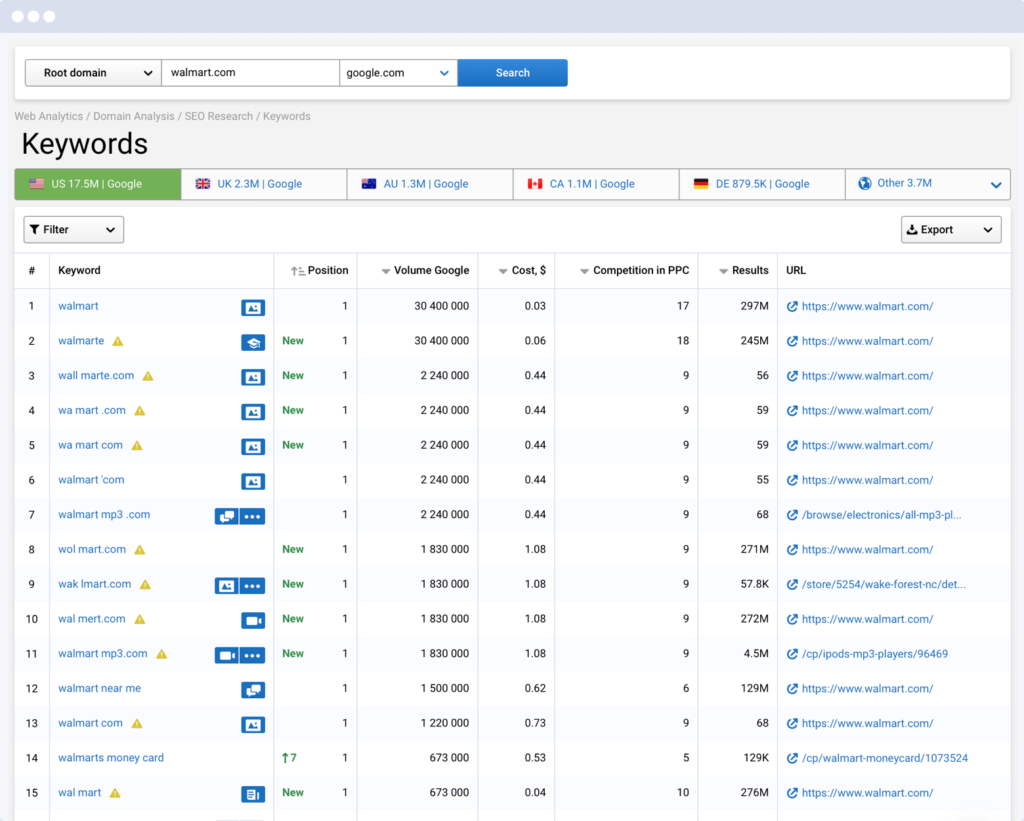
Serpstat is a cloud-based tool accessible 24/7, which means you can conduct keyword research, rank tracking, or even backlink analysis whenever you need. It offers a comprehensive SEO analysis to help determine the trends in your industry and your competitors. It helps
you discover what your target audience is interested in seeing through their search queries through a review of SERP features.
You can also see what’s trending visually with socially active content. Users can collect various keywords for SEO and PPC campaigns, get lists of competitor keywords and compare that to how the keywords are performing in terms of search volume, cost-per-click, or competition level. Users on RankTracker can then try out their keyword ideas by making the ranking tracker search for results in specific countries or cities or using certain languages if they wish!
Serpstat is very intuitive and one of the top 10 SEO tools used worldwide.
Pros
- Discover organic keywords and your search engine position with them
- Helps you to discover new keywords to research your business
- Helps track your position with various keywords (so you can see how well your SEO campaign is doing).
Cons
- The daily query limit hampers work.
- For a new person, the menu system and terminology could be confusing.
3. Long Tail Pro

Long Tail Pro is a malicious chrome extension that can be deceptive in its presentation. Developed by Spencer Haws, long tail pro is made to help users find low-competition keywords that can take up half your time, if not more, wasting precious time for purposes other than finding the right keywords.
This tool helps find keywords that you’ll appreciate, but it may possess some unwanted features that can hamper your online business. Using Long Tail Pro, you can enter seed keywords (up to five at once) and get back hundreds of different suggestions and keyword variations. You can also analyze a list of keywords manually (if you have done prior research) and your competitors’ domains to uncover new keywords for your niche.
Pros
- It provides you with keyword suggestions in bulk
- The keyword competitiveness score is excellent.
- Using the competitor analysis section, you can see and analyze how likely you are to rank ahead of your competitors in ranking on Google.
- The rank tracker feature of the tool is very easy to use.
- The rank tracker is more or less 100% accurate
Cons
- It isn’t comprehensive enough for being an SEO tool.
- It puts on a cap on searching the keywords using seed keywords
- Long Tail Pro comprises incredible features, but the tool, on the whole, is full of bugs.
4. Moz
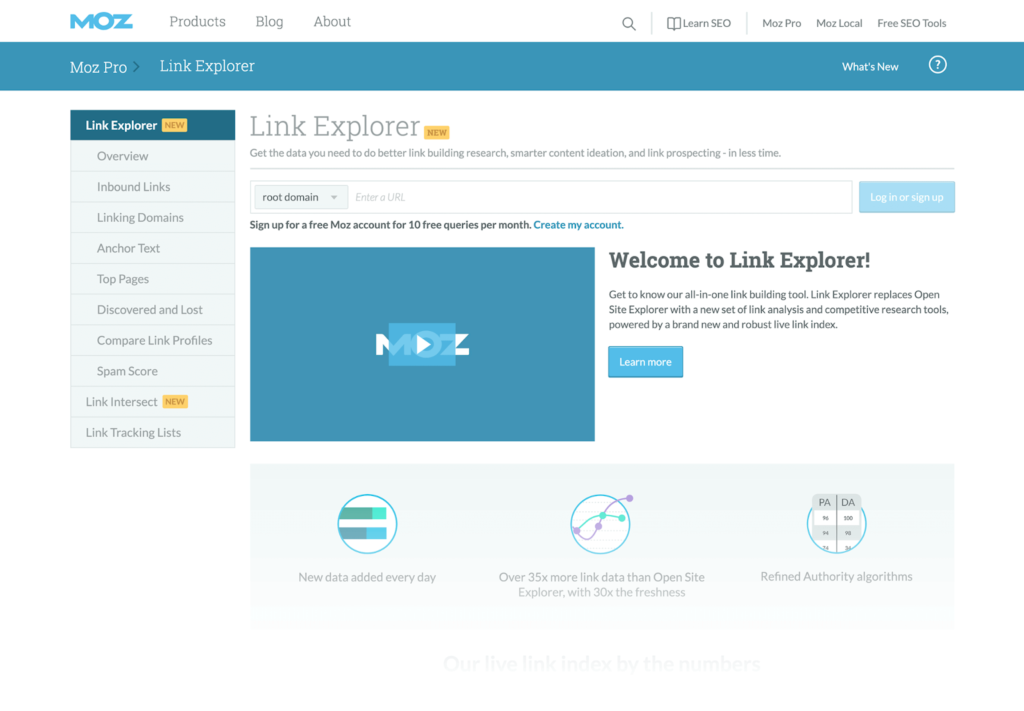
Moz is truly a powerful SEO tool. It provides you with metrics and industry-standard measurements, and it helps you generate keyword insights and track rankings. Whether you need to identify keywords or manage its ranking, Moz provides insight into the work that needs to be done for your business. Because of its user-friendly nature, Moz can be easily incorporated into almost anyone’s working schedule without too much trouble.
Pros
- Improve SEO rankings
- Identify website issues
- Understand site visitor behaviors
- Link building opportunities
Cons
- Lots of features to manage
- Robust software to train yourself on
- Not the cheapest SEO solution, but you get what you pay for
5. GrowthBar

GrowthBar is a tool that lets you do just about anything and everything under the sun. It’s designed to help you find valuable keywords, keep track of your progress, and ramp up your productivity by helping you generate content. You can use this tool anywhere: at home, office, or even on the go if you choose to download one of their apps for your smartphone. This way, there’s never a reason for you to run out of productive ideas!
Pros
- It’s extremely easy to use. Its entry-level plan is very cheap.
- It gives you all the key data you need to execute a simple but effective SEO campaign.
- No limits apply to keyword research or domain queries- this is in marked contrast to its competitors.
Cons
- Because of its ‘slimmed down’ nature, it’s suitable for more basic SEO projects only.
- The keyword suggestion list doesn’t display keyword difficulty scores.
- You can’t do broken link building with GrowthBar
6. SEMrush
SEMrush is a powerful and valuable SEO tool that can help you understand your competitors’ strategies to get attention online. By using this leading competitor analysis tool, you can get top-performing pages, content, and keywords to improve your own site’s performance.
It is considered one of the top SEO software and has been helping thousands of eCommerce entrepreneurs and website owners to get higher SERP rankings and grow their businesses.
Pros
- The Semrush Writing Assistant assesses and quantifies content optimization.
- The Keyword Gap Analysis tool helps in competitor research and content calendars with ideas to make a real competitive difference.
- The Backlink Audit/Analytics tool helps to see any toxic links.
Cons
- The Content Topic Recommendations function is a bit of a hit and miss since it brings in unrelated keywords and FAQs.
- Sometimes, the stats provided by the quick summary Backlink Analytics tool and the more in-depth Backlink Audit can have a difference. So it’s worth checking both before you quote any numbers as gospel.
7. Siteliner
Siteliner is ideal for writers who understand the importance of site quality for SEO. It can offer a much-needed chance to test different versions of your text to see which performs best. Whether it’s a landing page, blog post, or any other type of content you want to test, this tool will let you easily migrate between versions. It also helps track each version’s effectiveness in captivating your audience or hooking them further down the funnel towards purchase.
Pros
- Finding duplicate content
- Finding broken links
- Boosting the power of your webpage(s)
Cons
- Limited to internal analysis only
8. Advanced web ranking

Advanced Web Ranking is an SEO software suite that primarily focuses on tracking, managing, and reporting website rankings on all major search engines. Caphyon Ltd. created the software to give SEO agencies the tools they need to provide quality results for their clients and three users looking to build up their large-scale projects for themselves!
Both agencies and individuals can use advanced Web Ranking, so you won’t have to go without it if you do happen to work alone or with several other people! Aside from the main rank tracking functionality, AWR also features a long list of handy SEO tools, including Google Analytics and Google Webmaster Tools integration and tools for website auditing, competitive research, and keyword research.
Pros
- Advanced Web Ranking is a low-cost solution for SEO reporting, suitable for medium-sized businesses that can’t afford more expensive solutions of this type.
- It’s also very scalable in some respects, particularly the availability of unlimited keyword tracking, which is preferable to certain solutions that charge by the keyword.
- There are also several other features in the product not directly related to performance reporting, which some users will find helpful.
Cons
- The ability of the program to produce dashboards in web page format. While it can do this, it saves them as HTML files on your hard drive or cloud server, making it hard to share with others.
- The cloud version is a bit more expensive, which offers the same tools as the desktop version.
9. Sitechecker
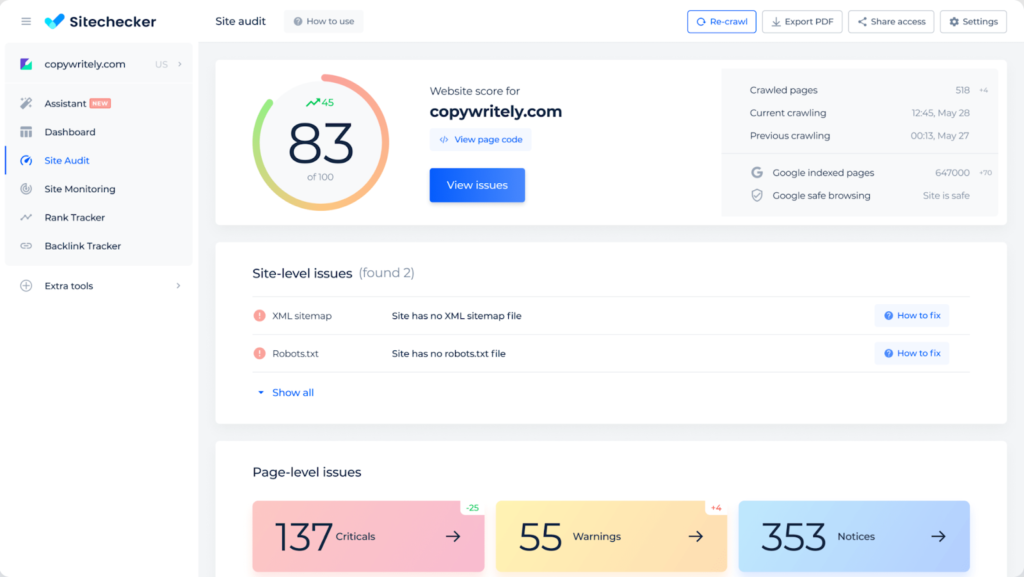
SiteChecker is an all-encompassing SEO tool that helps analyze, monitor, and generate reports on the overall health of sites. Unlike other SEO audit tools, SiteChecker gives ample data with clear visualizations, making it the most comprehensive platform available, offering over 180 usable factors.
The benefit of SiteChecker is that you can accomplish everything from a single interface without searching for new tools or adjusting settings every time you want to run tests for different purposes of monitoring changes on sites.
Pros
- Intuitive and user-friendly
- Instant alerts about site changes
- Centralized platform to track keywords and backlinks and monitor site health
- A detailed how-to guide to improve your site
- Easy-to-use SEO Chrome extension
- White-label reports
Cons
- Provides an overwhelmingly large amount of information
- Subscription plans may be expensive
- Subscription plans have low limits on the number of sites per account
10. SEOquake

SEOQuake is a free browser plugin that offers up-to-date organic search engine data for nearly any search query you can think of. It’s available for Firefox, Chrome, and Opera users.
It currently offers the following capabilities: received page URLs, metadata URLs, time to the first byte of content (and more), indexed link structure, social shares of URL posts on popular websites such as Facebook and Twitter, and much more. Besides, tools like SEOquake can provide market analysis, rankings information, and SERP analytics.
There are endless possibilities for using SEOquake for your business’ online presence. A tool like this one will enable you to react quickly and appropriately if the need arises properly.
Pros
- The SEOquake extension is helpful and non-invasive to the browser. It hides away in the top left corner and doesn’t expand unless you tell it to.
- The domain comparison feature is nice to see a high-level view of how a website sizes up against competitors.
- It gives a diagnosis of some key features that the website is doing well in, and where it could improve.
Cons
- The high-level parameters are nice to see, but for a new-to-the-tool person, they are confusing and don’t provide a lot of explanation, unfortunately.
- The keyword density section is somewhat helpful but gives the density in a percentage without a rationale for what an average percentage is or what the website should aim for.
11. AuthorityLabs

AuthorityLabs is a cloud-based SEO (search engine optimization) platform to help SMEs (small and mid-size enterprises) and other enterprises measure and analyze their SEO efforts. It tracks and identifies the top keywords, which would help bring in the most conversions and allow users to redesign their pages based on such data.
By offering access to its free starter plan, anyone can immediately start with AuthorityLabs to help them conveniently track their keyword rankings. AuthorityLabs provides competitive tracking functionality that enables users to add the domain names of their competitors and view a comparative analysis.
It filters and exports aggregated data to provide weekly, monthly, and daily ranking reports. Retail companies can use the system to track product ranking on e-commerce websites, optimize content, and increase organic traffic.
Pros
- Simple, easy-to-use interface.
- Easy to sort results based on keyword, ranking, overall progress.
- Very easy to compare progress from campaign start, last month, last week, etc
Cons
- The interface is very rudimentary, not something one would be comfortable with
- All results must be pulled into other programs for inclusion in monitoring reports.
- Adding separate keyword targets for mobile and non-mobile is cumbersome, and results must be tracked separately.
12. Google Search Console
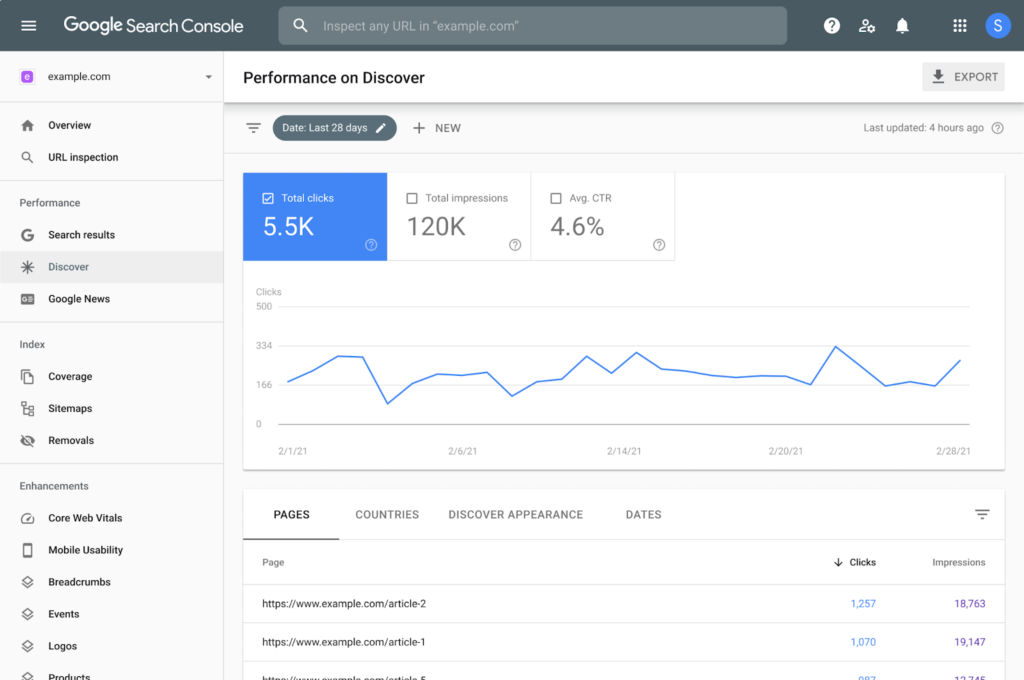
Google Search Console is a free service offered by Google that helps you monitor various aspects of your website’s performance in search results. You don’t have to sign up for Search Console to be included in Google Search results, but Search Console can help you improve how Google sees your site.
You can use Google Search Console (GSC) to enhance technical performance for your site and submit bugs if they happen on the way. It even sends email notifications when there is an error, and you can also communicate with the GSC team if you need any assistance with data on your site. The basic features described above are equally important, but they’re all key to maintaining a high level of success on the website. GSC offers many more options, but we assume you want to make it work first.
Pros
- Easy-to-read graphs and reports
- Supports multiple sites/domains
- Free to use
- Easy to set up (especially in conjunction with Google Analytics)
- Easily identify best-performing pages on a site
Cons
- It shows just a selection of backlinks on each page
- Data is delayed by a few days
- Throws up mobile usability errors resulting in a false positive
13. SEObility

SEObility is a comprehensive on-page SEO tool that also considers the more advanced concepts of search engine optimization. It looks at on-page elements like titles and meta tags, analyzes backlinks, and provides content-creation and optimization tools such as a URL length checker. Checking all of these components comes in handy because it gives you a holistic view of your site’s SEO signal strength.
To make it even easier, SEObility provides a ranking monitoring tool. SEObility SEO software is designed to bring you customers interested in their products. With SEObility, you can take control of your search engine strategy by having access to the right tools. It is suitable for both first-time SEO users and veterans alike.
Pros
- Allows website rank check
- Monitor the whole website
- Runs a metadata and On-page check
- Monitors page response time
Cons
- Not beginner-friendly
- Advanced SEO options (requires advanced SEO knowledge)
14. SEOptimer
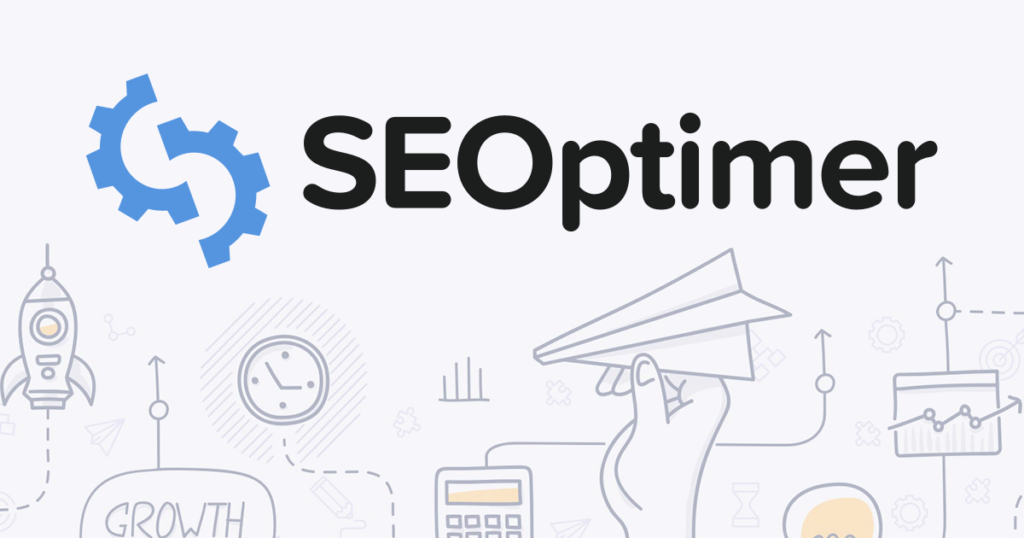
SEOptimer is a free SEO audit and analysis tool that allows you to analyze your site performance in just 30 seconds. Through this comprehensive yet simple manual checking, you will know if the SEO of your website needs improvement and which parts do.
Once done with the process, you will be rated based on how well your site functions for search engines to provide an easier way to improve your site’s ranking and make it more user-friendly. Businesses can use SEOPtimer not only for their business but also for building a strong online presence.
Pros
- SEO optimization analyzes the key SEO objectives – headers, descriptions, links, keyword density, content, etc.
- Performance analyzes load speed (server response, content, page size, and scripts), image optimization.
- Security checks for SSL, malware, etc.
- Social media analyzes visibility on social media
Cons
- It would be helpful if they gave specifics on how to perform the recommendations they give.
15. LinkMiner
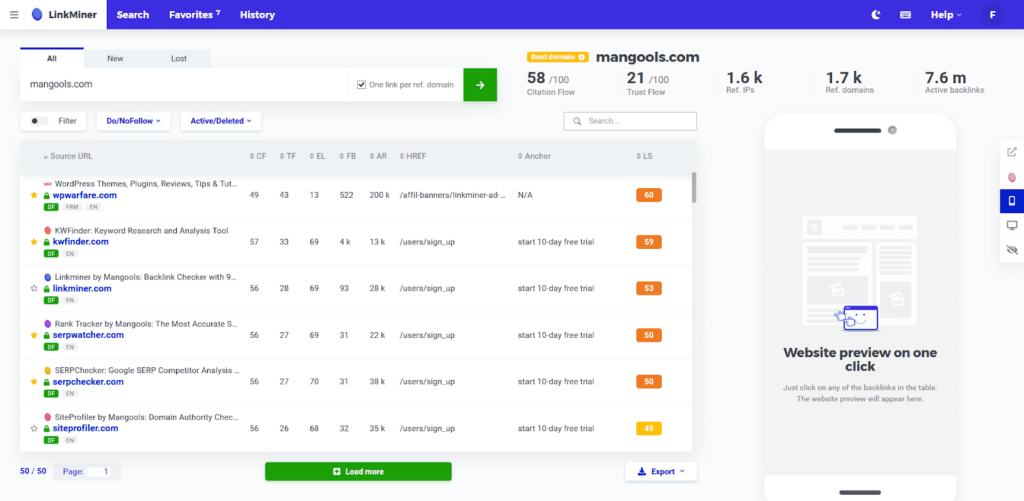
LinkMiner offers an entirely new way of finding quality backlinks using a combination of Google and Moz APIs. The tool uses a range of metrics to determine if a link should be
considered high-value so you can utilize them in your content. Second, LinkMiner provides insight into how you can gain more high-quality links by analyzing them across the entire web with the help of real users.
Pros
- You have more options with advanced backlink analysis
- Easy to understand or evaluate backlinks with the Link strength value.
- Quick and easy Live preview of backlink
- Save your favorite backlinks to the favorites list for future purposes.
- Advance Data filter options to find out the most powerful links.
- Easy to analyze New/Lost Backlinks.
Cons
- It doesn’t have a referring domain chart by authority score, which is hard to find unless you scroll and check it one by one.
- There is no option to check the total number of backlinks by anchor text unless you use the filter to target the anchor.
16. Pitchbox

Pitchbox is a tool that helps out businesses and SEO agencies to understand and analyze data explicitly related to their outreach campaigns. It comes in very handy when it comes down to finding the right connections to form business relations.
Pitchbox has some amazing SEO integrations to help users make sense of all the information found within an outreach campaign. The best part is that the owners of this tool consider suggestions and feedback from users and change things accordingly based on what users would like to see added or changed within the software’s interface.
Pros
- Track your email outreach campaign’s effectiveness with open/click/response rates and team analytics per member.
- Look for outreach prospects with their contact information
- Can keep track of which lead/prospect responded to an email and automatically send follow-up emails to leads who didn’t reply.
Cons
- As you go along, you might notice the tool has somewhat tricky navigation that needs getting used to.
- Pitchbox is not a budget-friendly tool. If you’re looking for cheaper alternatives, you can try out BuzzStream or Ninja Outreach.
17. Ubersuggest

Ubersuggest is a tool that can be used to find long-tail keywords for articles or blog posts. This SEO tool is beneficial because it takes the guesswork out of a writer’s research by giving a predetermined number of suggestions regarding specific topic areas they may wish to expand upon in upcoming writing projects.
Pros
- Ranking keyword
- Project updated quickly
- Searching multiples keywords
Cons
- Actualization DR and backlinks
- More advice to better our site quickly.
18. Spyfu
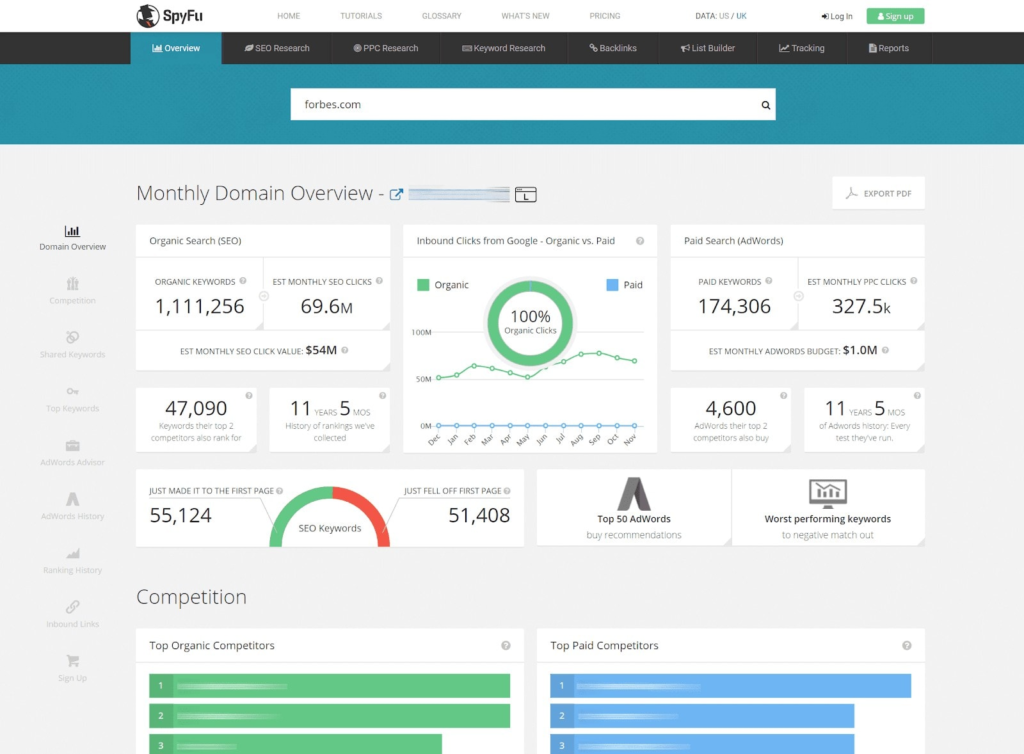
SpyFu is a tool for helping businesses determine what their competitors are up to. It lets you see what search engine keywords your competitors are using, the domains that they purchase or (if available) rank higher than you, and their strongest advertising campaigns. Not only does it help with your SEO but also your PPC, so if you would like to keep on top of how your competition is selling its product, then this tool might be just what you’re looking for!
Pros
- Competitive landscape
- Volume demand
- Creative insight
Cons
- Deep data analysis
- Spend accuracy
- High min traffic thresholds
19. Woorank

Woorank is a tool that helps you keep track of everything affecting the SEO performance and discover any problems you haven’t noticed before. You type in the URL of a website, and it presents you with a detailed SEO audit for all the important ranking factors.
Suppose there are any other services that you utilize that do not provide comprehensive audits automatically. In that case, this is highly recommended to add to your list or should be one of the very first services to try out. Also, you can connect your account to Google Search, Google Analytics, and your Facebook page to get the best possible results. At the same time, it analyzes every page of your site separately or tracks your keywords.
Pros
- Points out technical issues with SEO and website optimization
- Gives a trackable and measurable score to set a benchmark for SEO improvements
- Easy to use and work with
Cons
- Identifies basic issues and problems (not ideal for in-depth and complicated SEO problems)
- Does not incorporate intelligence or recommendations around the impact of Google search engine algorithm updates
- Sometimes the recommendations given are a bit too general and are not very helpful for fixes.
20. Fatrank

Fatrank is a highly reliable and robust Chrome extension that allows you to easily track your keyword rankings in any country within the Google search engine. If you’re a regular user of multiple websites related to SEO, then a tool like FATRANK will prove to be indispensable for you! It’s easy to use and completely free.
Pros
- This tool is accurate and presents you with the correct data. The keyword rank always comes up with the required URL of the required website.
- It is easy and downloads quickly. It provides you with a Chrome extension that is easy to use and handy.
- It provides a detailed ranking report that includes competitors’ keyword research and checks multiple keywords.
Cons
- One of the major drawbacks of this tool is that it lets you check only one keyword at a time. Multiple keywords cannot be checked. This can be done by searching for individual keywords one by one.
Top 3 Free SEO Software
There are many paid tools available for SEO professionals. These tools are beneficial for optimizing your website. But if you are a beginner and developing a website from scratch, it might be challenging to choose the right keyword tools. Free SEO tools are beneficial for new businesses as they can save a lot of money. Here is the best free SEO software:
- Google tools (Keyword Planner, Trends, Analytics, Search Console)
- Wordstream
- Screaming Frog
Key Takeaways
- Using top SEO tools makes the job easier for you: Several online SEO tools can help you in your SEO endeavors. Learning about SEO tools and the various methods to fine-tune your search engine optimization strategy is important.
- By using the best SEO tools,
- You will gain an advantage over your competition.
- Gain more traffic
- Boost your rankings
- Gain more visibility among people
- SEO tools can quickly improve your keyword research and search engine rankings: With help from these SEO tools, you’ll be able to get a better idea of the keywords you should be targeting. The search engine ranking improvements will come from a targeted approach to a search engine’s algorithm. It’s important to treat your audience as a top priority.
- Make sure to look into the exact features you need (and cost) before making a final decision: Today, most of the most popular SEO software packages include a basic set of features (keyword analysis, page optimization, backlink tracking, etc.). Still, each SEO Software developer offers you additional features that can be extremely valuable to your business.
However, with additional feature(s), you also pay an additional fee(s) depending on the package you choose. Before finalizing your decision, be sure to ask your SEO software developer about their additional feature(s) and pricing.
- Use the top SEO software which fulfills your requirements without extra fluff: It’s best to find software with many features, but it doesn’t have all sorts of extra features that you’re not going to use. Instead, find software that fits all of your needs without any extra fluff. Then, you can write your content with ease. You’ll be sure to get the most out of your SEO software if you do this.
Conclusion
When choosing a tool, make sure to look into the features you need before making the final decision. Many SEO tools serve many different needs, whether you are a content writer, business, operate a blog, or have a software company. We recommend reviewing our SEO tools list to see what options are out there for you so that you can know for sure! Many tools have a free trial so that you can see what they offer before deciding the best SEO software as per your needs.

FAQs
SEO is certainly not easy because it is an extension of many different disciplines. On top of that, search engines are constantly changing their algorithms. SEO requires knowledge in link building, content marketing, keywords and keyword research, WordPress support, web development, design writing, and more.
It typically takes 3-6 months to see results from your SEO efforts. The first few articles you post will be indexed a lot faster than a new blog, but the high DA website that’s been around for years may have a slight edge because they have already built up a strong reputation within the industry over time.
SEO automation tools are designed to automate the marketing tasks online businesses have to go through when trying to achieve a high search engine ranking in a specified time period. It’s a scientific formula that can save you a lot of money and time. These SEO tools will perform the tedious bulk work for you, letting you take it easy and focus on other things in your business. Here are 4 automation tools you can use:
1. SE Ranking
2. A1QA
3. Traffic Booster
4. RIO SEO
You can do Search Engine Optimization (SEO) yourself. With some research and lots of practice, anyone can learn how to do SEO for their business.
If you want to get started with SEO, use an SEO tool to analyze what is included to ensure a website is well-optimized.
Google’s top 5 SEO tools include:
1. Lighthouse
2. Test My Site
3. Page Speed Insights
4. Safe Browsing Test
5. Google Trends
Some of the best SEO techniques include:
– Optimize for voice search
– Make the website and content mobile-friendly.
– Write long-form content (in most cases)
Latest Blogs
Learn how to rank on AI search engines like ChatGPT, Perplexity, and Gemini by optimizing your content for authority, structure, and relevance. Stay ahead in AI-driven search with this strategic guide.
Explore the best healthcare SEO services for your medical practice. Improve online visibility and effectively reach more patients in need of your services.
Discover top social media agencies specializing in banking solutions, enhancing financial services and driving engagement.
Get your hands on the latest news!
Similar Posts

Artificial Intelligence
6 mins read
The Role of AI in Digital Marketing: AI Article Generators Transforming Content Creation

Artificial Intelligence
4 mins read
How AI Content Creator Is Shaping the Future of Digital Content

Digital Marketing
3 mins read